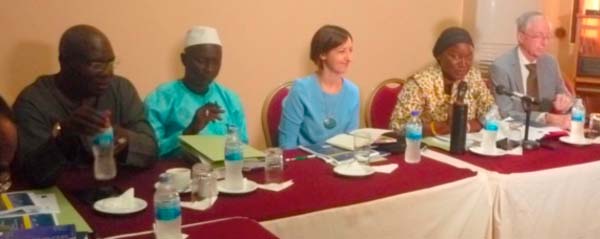
Following
the success registered in the piloting of the Access to Justice and Legal
Education Project in the three regions (WCR, LRR and URR) last year, the
project is now expanded to cover other regions (NBR and CRR-South) that were
not covered last year.
To
that end, an orientation meeting was yesterday at the Ocean Bay Hotel, to
introduce the implementers and other stakeholders in the project and the
implementation strategies.
The
Access to Justice Civic Awareness Campaign is part of the EU Technical
Assistance to the Government of The Gambia.
The
European Union-funded Access to Justice and Legal Education Project aims to
contribute to better democratic and economic governance in The Gambia, through
improving access to justice and legal education.
The
objective is to improve access to legal service/remedial justice, especially
for vulnerable groups; legal education, training and research skills, as well
as information, and management of cases.
A
major focus of the project is the civic awareness campaign which is geared
towards ensuring that local communities are aware of their basic legal rights
and obligations, and how and where to seek redress.
The
overall goal of the campaign is to enhance access to justice through civic and
legal education, and provision of information on available justice mechanisms.
The
specific objectives are to promote public awareness on civic rights and duties;
promote public awareness on the obligations of law enforcement agencies, as
well as disseminate knowledge and enhance confidence in the tripartite justice
system.
In
her welcome remarks, Janet R. Sallah-Njie, a key expert in modern law,
explained that the campaign was executed by key partners such as the National
Council for Civic Education (NCCE), National Agency for Legal Aid (NALA), the
Alternative Dispute Resolution Secretariat (ADRS), and the Female Lawyers
Association-The Gambia (FLAG).
She
added that the implementers were supported by a technical committee constituted
by key national stakeholders, who are duty bearers in the realm of access to
justice and, therefore, played a very vital role in the design, content and mode
of implementation of the project.
She
further stated that following the successful implementation of the three pilots
in the three regions, an evaluation and review of the project was carried out
with the review report making significant recommendations to ensure the
sustainability of the civic awareness campaign.
“We
are, indeed, fortunate and honoured that through the magnanimity of the
European Union, the project is benefitting from a six -month extension, thus
affording us the opportunity to implement the Adjusted Model of the Civic
Awareness Campaign in two more regions of The Gambia namely, CRR and NBR.”
Mrs
Sallah-Njie added that the overall campaign has been extended beyond the narrow
ambit of sensitizing and raising awareness on accessing the tripartite justice
system.
The
content, she said, would be expanded to include, among other things: democracy
and the role of citizens in a democracy; responsibilities of citizens in a
democracy; civic rights and duties; roles and responsibilities of institutions
and structures within the community; prevention of corruption and corrupt
practices, as well as employment and labour rights.
She
hoped that through this extended mandate, they would be able to address, on a
holistic basis, the whole ambit of the civic rights and duties of the
communities, and raise their awareness to enable them seek redress and
appreciate their roles and responsibilities in a democracy.


